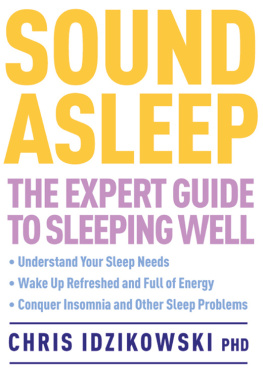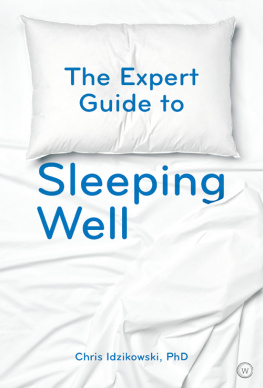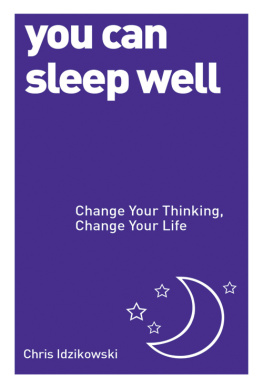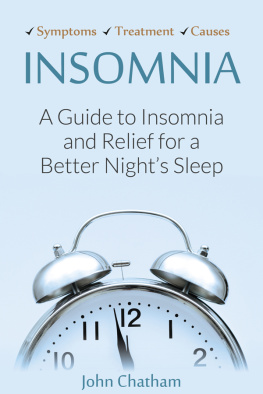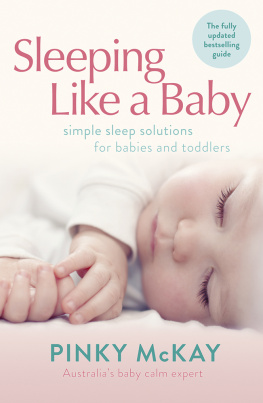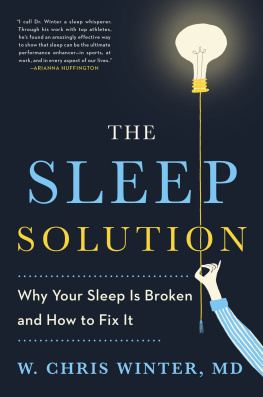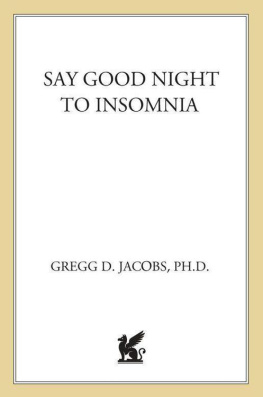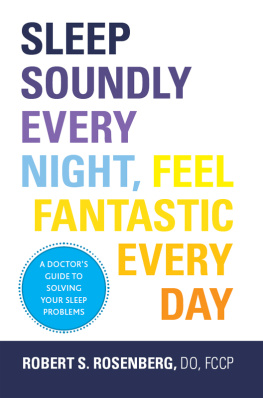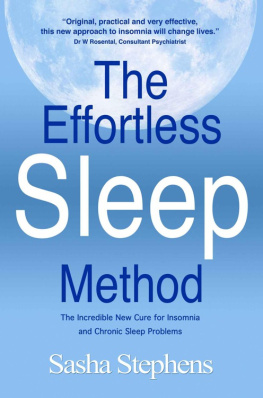SOUND
ASLEEP
THE EXPERT GUIDE
TO SLEEPING WELL
CHRIS IDZIKOWSKI

For Hilary
xx
Dr Chris Idzikowski, BSc, PhD, FBPsS, is Director of the Sleep Assessment and Advisory Service and the Edinburgh Sleep Centre. A leading expert on sleep and its disorders, he has served as Chairman of the British Sleep Society and has been a long-term council member of the Royal Society of Medicines Sleep Medicine Section. Dr Idzikowski has also sat on the boards of the European Sleep Research Society and the US Sleep Medicine Foundation. He is the author of five books, including Learn to Sleep Well (Watkins).
FOREWORD
Ive often been asked why I became interested in sleep. After all, for most people sleep is something they barely think about it comes as a surprise that anyone should devote their working life to understanding it. The short answer is that I dont really remember. I certainly didnt wake up one day and have an extraordinary interest in why I had slept the previous eight, nine, ten hours. I do know, though, that my Latin teacher, my wife, and my late friend and mentor Emeritus Professor Ian Oswald all had something to do with it. Their teaching methods, frank criticism of my work and fascinating insights into the human brain have all inspired me.
Looking after your sleep and doing it in a way that isnt harmful (by not using sleeping pills or alcohol, for example) is fundamental to your well-being. This book brings together the essence of everything Ive learned about sleep in a way that I hope is practical and accessible. My aim has been to give you not only information about the nature of sleep, but also guidance on actions you can take at home to improve your sleep quality. I havent shied away from the importance of conventional medicine in the treatment of sleep disorders (Im a scientist, after all), but I hope youll see that there are lots of ways in which you can enjoy better-quality sleep through simple changes to your lifestyle and by performing simple tasks that promote sleep.
Its important that you work through the book from the beginning. In Chapters these early assessments when youve read later parts of the book, you can gain a good measure of your progress as you start to implement my techniques and tips for sleep improvement.
Arguably, the critical chapter in the book is the chapter on sleep hygiene. A safe building is constructed on deep and solid foundations. Sleep hygiene is the foundation of refreshing sleep. You cannot improve your sleep at any level without making good sleep hygiene your priority.
In Chapters , Ive looked at some of the specific challenges that we face for our sleep quality at particular times or stages in our lives, as well as in particular circumstances.
If you think you have a sleep disorder, aims to give practical advice on treatment Ive covered major disorders, as well as some of the more unusual ones. If you have an insomnia, I hope to enable you to make informed choices about your treatment, both at home and with the help of a sleep centre or a doctor.
Finally, in , Ive provided a summary of conventional and complementary therapies that are often used to help people overcome sleep problems. Taking a scientific view of whats available, I hope Ive offered robust information and advice so that you can choose remedies and therapies that will have actual beneficial effects on your sleep improvement, if you need them.
Overall, I hope this book enables you to better understand the unique nature of your sleep so that you can put in place strategies that work for you. Your physical, emotional and mental well-being rely upon sleeping soundly. I wish you a peaceful night, every night.
Chris Idzikowski, January 2013
AUTHORS ACKNOWLEDGMENTS
Id like to acknowledge simply everyone Ive worked with friends, colleagues, staff, collaborators, students and so on have all contributed to my thinking but especially my long-suffering editor Judy Barratt and publisher Bob Saxton.
CHAPTER 1
SLEEP AN INTRODUCTION
We know that in the Paleolithic era early man slept on beds of straw, grass, brushwood and pelt. From observing the actions of chimpanzees, we know that our animal ancestors are to this day particular about their sleep. Chimpanzees build nests in trees to keep themselves safe from predators. These nests consist of a mattress lined with soft leaves and twigs. Across time and species, it seems that we dont just need sleep, we need good-quality sleep in comfort and safety.
In this chapter Ill try to answer some fundamental questions about sleep. What is it? What is it for? What are its features? Sometimes the answers are straightforward; often they involve the complex interplay of science, history and educated guesswork. Sleep remains something of a fascinating conundrum, but one that is essential to our existence.
WHAT IS SLEEP?
How would you describe sleep? Is it a period of complete shut-down? Is it total rest? Is it unconsciousness? In fact, sleep is none of these things. Although many people describe sleep as the bodys opportunity for stopping, in truth it is one of the most active periods of the day (or, rather, night) for our brain. There is no shutting down two regions of the brain communicate and co-operate to create the state of sleep. In other words, sleep is an active process, not a passive one (and in the morning, the same two regions of the brain work together to create wakefulness). Some scientists think that we burn fewer than a hundred calories less during sleep than we would if we were awake but resting. This undermines the next hypothesis, that sleep is rest: sleep does involve physical rest, but we can rest nearly as effectively without actually sleeping. We arent unconscious during sleep, because a persistent or loud noise or other physical disturbance will wake us.
One of the most precise ways to describe sleep is to think of it as a temporary severance between the outside world and our perception or experience thereof. At the precise moment of sleep, connections between our brain and our senses virtually cease to function. During sleep we cant really hear, taste, smell, feel touch, or see (except in our dreams). Another feature of sleep is that we can be woken from it (it is a reversible state). During dreaming sleep our limbs are immobilized in order that we cant act out our dreams.
In physiological terms, sleep is a period of distinct cycles and stages. An adult with healthy sleep each night goes through four or five sleep cycles (see ). Sleep is triggered when two particular regions of our brain communicate with one another. Well go into which later, but the process is rather like two conductors trying to conduct a single orchestra to play the perfect tune. When they succeed and the instruments play in harmony, we fall asleep easily. As long as no one steps out of time or tune, we stay asleep. When the instruments are out of kilter, our sleep may not be restful. When this problem persists, we say we have a sleep disorder.
WHAT IS TIREDNESS?
Tiredness comes in many guises. The most common form of tiredness is the form we should all feel at the end of the waking day a general fatigue that puts us in mind that its time to go to bed. This is a perfectly normal part of daily life. In itself, it may come as a feeling of mental tiredness (a long day at the office, which makes you feel sleepy), or physical tiredness (an active day hiking, cycling or gardening or doing physical work) neither of which is a problem, as long as you feel refreshed again after a rest or ideally a good nights sleep.

